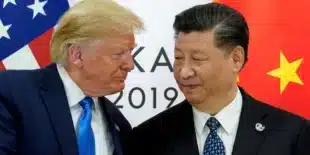Several financially struggling Chinese cities are aggressively seeking back taxes from businesses, dating as far back as the 1990s, in an attempt to mitigate fiscal deficits exacerbated by a prolonged real estate downturn.
Recent disclosures by at least eight prominent publicly traded companies reveal demands for substantial payments of overdue taxes, sparking widespread concern online and undermining the already fragile confidence among businesses. Notably, V V Food & Beverage, China’s leading soy milk producer, reported that a local tax authority in Zhijiang, Hubei, claimed the company had not filed tax returns for the period from 1994 to 2009, resulting in a tax bill of 85 million yuan ($11.7 million).
This tax enforcement trend reflects local governments’ desperation to find new revenue sources amidst economic stagnation and a sharp decline in real estate profits—a primary financial resource. These authorities are not only targeting companies for past tax discrepancies but have also collaborated with police to enhance tax enforcement, causing additional public dismay.
Craig Singleton from the Foundation for Defense of Democracies noted that regional governments in China are under considerable pressure to meet fiscal targets, especially in the current economic climate. To cope, some localities have resorted to extreme measures such as imposing fines for trivial licensing oversights or slashing essential subsidies.
Amid the uproar, the State Administration of Taxation attempted to soothe public nerves by denying any new national or industry-specific tax inspections, despite confirming ongoing checks for potential misconduct.
The concept of “Police & Taxation Joint Combat Centers,” which integrate local police and tax authority efforts and were initially tested in Jiangxi in 2021, has fueled fears of more severe tax enforcement in the future. This approach, coupled with the national government’s mixed messages, has left businesses feeling uncertain and vulnerable.
Experts like Frank Tian Xie from the University of South Carolina Aiken criticize the approach as “extreme,” questioning why tax authorities didn’t act sooner if these taxes were legitimately owed, suggesting possible government negligence in earlier tax collection efforts.
The financial repercussions for companies could be dire, potentially leading to bankruptcies due to the compounded costs of unpaid taxes, fines, and interest. This crackdown could have widespread economic consequences, risking job losses and deterring investment at a time when the private sector is already cautious due to previous regulatory crackdowns and strict COVID-19 policies.
So far, the tax scrutiny has targeted privately owned firms across various sectors. For instance, V V Food & Beverage anticipates a significant impact on its profits, having earned just 209 million yuan ($29 million) last year. Similarly, Ningbo Bohui Chemical Technology had to halt production due to a substantial unexpected tax bill, and Zangge Mining faces a tax and fines bill totaling 480 million yuan ($66 million).
As these developments unfold, companies like PKU Healthcare, Shunho New Materials, ChinaLin Securities, and Yixintang Pharmaceutical have also settled sizable back taxes with local authorities, highlighting a trend that could reshape the business landscape in China.


